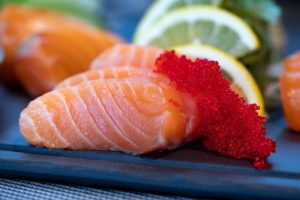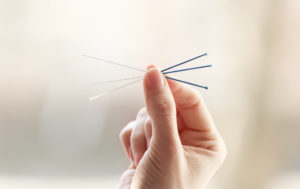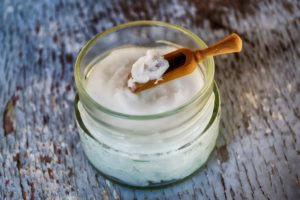TREAT YOUR ECZEMA NATURALLY
With Eastern Medicine

Did you know that around 10% of Americans — or 31.6 million people — have some form of eczema? While newborns are the most affected age group, around 3% of U.S. adults and children are affected by it, too. Kids tend to outgrow it by the age of ten, but for some of us, eczema comes and goes throughout our lives.
If you’re one of the 30 million Americans who has eczema, then you’ve probably sought out medicine or a cure, and often the treatments available just don’t cut it. That’s why many are turning to Eastern medicine for relief.
To give you some perspective on how Eastern Medicine can help, we discuss the condition a little more in depth below and provide some tips.
How to Treat Eczema the Eastern Medicine Way
Change Your Diet
 A great way to treat skin issues like eczema (including psoriasis) is to swap out unhealthy foods for, well, healthy ones. In other words, if you consume lots of junk food, your skin will show the effects of that!
A great way to treat skin issues like eczema (including psoriasis) is to swap out unhealthy foods for, well, healthy ones. In other words, if you consume lots of junk food, your skin will show the effects of that!
Here’s a brief list of foods and beverages that fall under the “junk food” umbrella:
- Fried foods
- Fast food (burgers, hot dogs, tacos, etc.)
- Soda
- Alcohol
- Candy/sweets
- Salty snacks (like chips or high-sodium dipping sauces)
- Processed meats
- White bread
- Condiments
- Sweet teas
- Energy drinks
That said, there are also “healthy” foods that are typically considered problematic for people with eczema because they can cause flare ups. Those include:
- Cow’s milk
- Eggs
- Soy products
- Gluten
- Nuts
- Fish
- Shellfish
Avoiding foods like these is a great starting point. Now, what to swap them with? Here are a few common foods that taste great and contain the essential nutrients your body needs:
- Fatty fish (think salmon, tuna, or sardines)
- Flax seeds
- Chia seeds
- Walnuts and almonds
- Spinach
- Cruciferous vegetables (bok choy, broccoli, cauliflower, cabbage, kale, etc.)
- Apples
- Blueberries
It’s also advisable to eat foods rich with probiotics. Typical foods in this category include:
- Unsweetened Yogurt
- Tempeh
- Miso soup
- Kombucha
- Sauerkraut
- Pickled veggies
- Kimchi
Notice there’s no meat on this list. That doesn’t mean you shouldn’t eat meat. You just need to be selective about what type of meat you eat and how often you eat it (moderation is key). Lean or grass-fed meats and wild-caught fish are typically better for you, and you need to limit yourself to one to two one-ounce servings per day.
If you’re looking for some Eastern medicine-friendly foods for healthier skin, here are some traditional Asian foods you can try:
- Squid and calamari
- Black soybeans
- Black sesame seeds
- Lotus root
- Chinese yam
- Chinese pine nuts
- Chinese cabbage
- Chinese cucumbers
- Chinese jujubes
- Chinese tofu
- Wood ear, enoki, oyster, and shitake mushrooms
Try Peony Creams to Reduce Skin Irritation
The peony is Chinese flower known as a symbol of elegance, compassion, and beauty. According to TCM, peonies boost fertility and help regulate menstruation.
However, peonies are also known to benefit your skin. In particular, they help fight aging tissue and soothe skin rashes. If you haven’t tried peony for your skin, you should look into peony extracts.
Try Acupressure to Alleviate Itching
 There are two key meridian points on your body that help reduce itching and irritation when you have a flare up:
There are two key meridian points on your body that help reduce itching and irritation when you have a flare up:
1. Large intestine 11 (or “Qu Chi”)
This meridian point is near the inside of your elbow. To find it, let your arm rest against your side, then pull it up as if you were holding something in the palm of your hand. The point is located on your inner elbow near the end of the crease and close to the bone. Rubbing this meridian clears heat, cools your blood, and reduces itching.
2. Urinary Bladder 40 (or “Wei Zhong”)
This point is exactly behind the knee, right in the middle of where it creases. Like the large intestine meridian point, this meridian also clears heat, cools your blood, and can help reduce itchiness when you have a flare up.
Try Sunflower Seed Oil and Virgin Coconut Oil to Treat
 Virgin coconut oil is touted as a natural cure all. That’s because it has antimicrobial and anti-inflammatory properties that fight fungi, yeast, bacteria, and viruses. These properties make it a great natural alternative to treat skin issues and a range of other common ailments.
Virgin coconut oil is touted as a natural cure all. That’s because it has antimicrobial and anti-inflammatory properties that fight fungi, yeast, bacteria, and viruses. These properties make it a great natural alternative to treat skin issues and a range of other common ailments.
However, just because it works for one person doesn’t mean it works for everyone. Next time you have a flare up, try rubbing coconut oil where it itches. If it doesn’t do much for your skin, you can try cooking with it instead.
If you have sunflower oil around, you can also apply it to your skin. Sunflower oil is a natural moisturizer that is said to have anti-inflammatory properties when applied to your skin (though this isn’t confirmed).
Love Your Skin, Love Your Body
Although eczema isn’t curable, there’s a lot you can do to alleviate its effects. Trying any of the holistic and natural approaches above will keep your body and mind healthy; they will also (hopefully) keep flare ups at a minimum!
If you have any other recommendations for alleviating eczema and its effects, feel free to share them in the comments below!
Comments (0)
Leave a reply
You must be logged in to post a comment.




